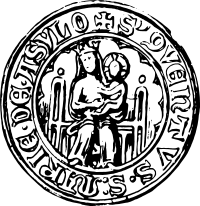Ås Abbey

Ås Abbey (Danish: Ås Kloster; Latin: Asylum) was a Cistercian monastery situated near the mouth of the River Viskan into the Kattegat in Halland, formerly part of Denmark but now in Sweden, near the present hamlet of Åskloster about 14 km north of Varberg, in Varberg Municipality.
The monastery was the first, largest and richest in Halland but is now one of the least known in Scandinavia.[1]
History
Ås Abbey was founded as a Cistercian monastery in 1192 and settled in 1194 by a community from its mother house, Sorø Abbey.
According to Kong Valdemars Jordebog King Valdemar II (1170–1241) gave the new monastery the royal farm of Ås (the exact location of which is no longer certain). The abbey was eventually the owner of about 250 farms and estates.
The abbey enjoyed great standing and prestige: two or three children of Magnus Eriksson, King of Sweden (1316–1374) and his queen, Blanka of Namur, were buried here.[2]
Ås Abbey was closed in the early 16th century and the buildings were destroyed during the Count's Feud in 1535.
There are no visible ruins, apart from two mounds, and the site lies buried under the later Åskloster farm buildings. The site of the monastery was found im May 2010 and the homepage of the project group is in Swedish but there are a lot of photos: http://askloster.web.surftown.se/ 2011 the southeast part of the monastery was excavated where there was a room with a nice stone floor. 2012 the eastern (dormitory) part of the monastery closer to the choir of the church will be examined.
Abbots
- 1194- unknown
- 1238-1241 Th[omas?]
- 1259 [Nicolaus - formerly abbot of Sorø, possibly abbot of Ås)
- 1343-1350 Andreas
- 1362-1378 Petrus
- 1379-1386 Johannes Mattisson
- 1386-1392 Niels (Nicolaus) Clemensen
- 1392 Nicolas Johannis (Pr[o]fessus)
- 1393 Niels (the same as Nicolas Johannis?)
- 1396-1398 Sven
- 1403?-1405? Nicolaus (Niels)
- 1403?-1405? Peter
- 1406? Nicolaus
- 1408-1458 Peter Thuwasson
- 1462-1481 Lindorm
- 1491-1492 Anders Bengtsson
- 1498 Anders Nilsson
- 1514-1532 Mats (Mattias) Eriksson
References
- ↑ Ann-Marie Skogsberg, 2005: Ås kloster - cisterciensernas asylum i Halland, pp.9-10. Södertälje: ISBN 91-7040-044-X
- ↑ Nordisk familjebok, 1800-talsutgåvan, p. 461.
Sources and external links
- Letter from Nils, abbot of Ås Abbey, 31 October 1405 (Danish)
- Nordisk familjebok, Uggleupplagan (1922) (Danish)
- Stadinn i Aranesi – den medeltida handelsplatsen vid Årnäs by (Swedish)
- Viskans dalgång – munkarnas laxfiske (Swedish)
- Model of Ås Kloster in the 13th century
- Hunehals Borg and Ås Kloster (Danish)
- Sverkeretten og 1100-tallets kirker og klostre (Swedish)
- http://www.youtube.com/user/5BJRZ#g/u Excavation 2011
Coordinates: 57°13′31.86″N 12°13′7.83″E / 57.2255167°N 12.2188417°E